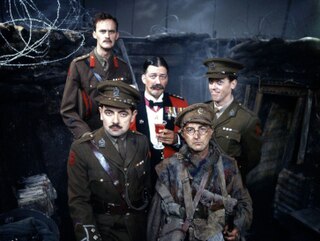
Blackadder is a series of four period British sitcoms, plus several one-off instalments, which originally aired on BBC1 from 1983 to 1989. All television episodes starred Rowan Atkinson as the antihero Edmund Blackadder and Tony Robinson as Blackadder's dogsbody, Baldrick. Each series was set in a different historical period, with the two protagonists accompanied by different characters, though several reappear in one series or another, e.g., Melchett, Lord Percy Percy / Captain Darling and George.

Comedy film is a film genre that emphasizes humor. These films are designed to amuse audiences and make them laugh. Films in this genre typically have a happy ending, with dark comedy being an exception to this rule. Comedy is one of the oldest genres in film, and it is derived from classical comedy in theatre. Some of the earliest silent films were slapstick comedies, which often relied on visual depictions, such as sight gags and pratfalls, so they could be enjoyed without requiring sound. To provide drama and excitement to silent movies, live music was played in sync with the action on the screen, on pianos, organs, and other instruments. When sound films became more prevalent during the 1920s, comedy films grew in popularity, as laughter could result from both burlesque situations but also from humorous dialogue.

Slapstick is a style of humor involving exaggerated physical activity that exceeds the boundaries of normal physical comedy. Slapstick may involve both intentional violence and violence by mishap, often resulting from inept use of props such as saws and ladders.
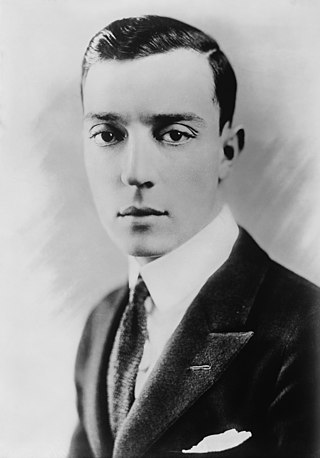
Joseph Frank "Buster" Keaton was an American actor, comedian and film director. He is best known for his silent films during the 1920s, in which he performed physical comedy and inventive stunts. He frequently maintained a stoic, deadpan facial expression that became his trademark and earned him the nickname "The Great Stone Face".

Rowan & Martin's Laugh-In is an American sketch comedy television program which ran for six seasons from January 22, 1968, to March 12, 1973, on the NBC television network. The show, hosted by comedians Dan Rowan and Dick Martin, originally aired as a one-time special on September 9, 1967, and was such a success that it was brought back as a series, replacing The Man from U.N.C.L.E. on Mondays at 8 pm (ET). It quickly became the most popular television show in the United States.

Mr. Bean is a British sitcom created by Rowan Atkinson and Richard Curtis, produced by Tiger Aspect Productions and starring Atkinson as the eponymous title character. The sitcom consists of 15 episodes that were co-written by Atkinson alongside Curtis and Robin Driscoll; the pilot episode was co-written by Ben Elton. The series originally aired on ITV, beginning with the pilot episode on 1 January 1990 and ending with "The Best Bits of Mr. Bean" on 15 December 1995.

A comedian or comic is a person who seeks to entertain an audience by making them laugh. This might be through jokes or amusing situations, or acting foolishly, or employing prop comedy. A comedian who addresses an audience directly is called a stand-up comedian.

Phyllis Ada Diller was an American stand-up comedian, actress, author, musician, and visual artist, best known for her eccentric stage persona, self-deprecating humor, wild hair and clothes, and exaggerated, cackling laugh.
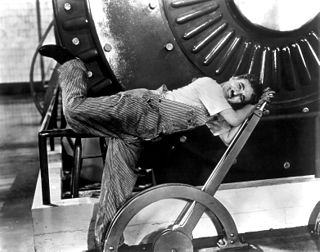
Physical comedy is a form of comedy focused on manipulation of the body for a humorous effect. It can include slapstick, clowning, mime, physical stunts, or making funny faces.

Blackadder Goes Forth is the fourth series of the BBC sitcom Blackadder, written by Richard Curtis and Ben Elton, which aired from 28 September to 2 November 1989 on BBC1. The series placed the recurring characters of Blackadder, Baldrick, and George in a trench in Flanders during World War I, and followed their various doomed attempts to escape from the trenches to avoid death under the misguided command of General Melchett. The series references famous people of the time and criticises the British Army's leadership during the campaign, culminating in the ending of its final episode, in which the soldiers are ordered to carry out a lethal charge of enemy lines.
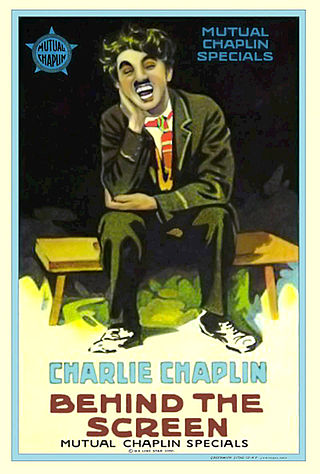
Behind the Screen is a 1916 American silent short comedy film written by, directed by, and starring Charlie Chaplin, and also starring Eric Campbell and Edna Purviance. The film is in the public domain.

Mr. Bean's Holiday is a 2007 comedy film directed by Steve Bendelack and written by Hamish McColl and Robin Driscoll, from a story penned by Simon McBurney. Based on the British sitcom series Mr. Bean created by Rowan Atkinson and Richard Curtis, it is a standalone sequel to Bean (1997). The film stars Atkinson as Mr. Bean, with Maxim Baldry, Emma de Caunes, Willem Dafoe and Karel Roden in supporting roles. In the film, Mr. Bean wins a trip to Cannes, France, but on his way there, he is mistaken for a kidnapper and meets an award-winning filmmaker after he travels with both a Russian filmmaker's son and an aspiring actress in tow.

Silent comedy is a style of film, related to but distinct from mime, developed to bring comedy into the medium of film during the silent film era (1900s–1920s), before synchronized soundtracks that could include dialogue were technologically available for the majority of films. While silent comedy is still practiced today, albeit much less frequently, it has significantly influenced modern comedic media.

Exaggeration is the representation of something as more extreme or dramatic than it is, intentionally or unintentionally. It can be a rhetorical device or figure of speech, used to evoke strong feelings or to create a strong impression.
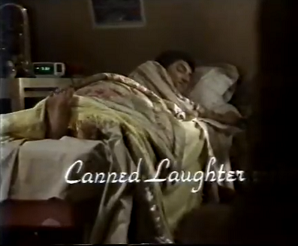
Rowan Atkinson presents... Canned Laughter is a British one-off comedy television programme featuring Rowan Atkinson, broadcast on 8 April 1979 on ITV. Atkinson plays three roles: the nerdy Robert Box, his sinister boss Mr. Marshall, and would-be stand-up comic Dave Perry, as well as an uncredited role as a radio announcer. Produced by LWT, the thirty-minute episode was directed by Geoffrey Sax.

Rowan Sebastian Atkinson is an English actor, comedian and writer. He played the title roles in the sitcoms Blackadder (1983–1989) and Mr. Bean (1990–1995), and in the film series Johnny English (2003–2018). Atkinson first came to prominence on the BBC sketch comedy show Not the Nine O'Clock News (1979–1982), receiving the 1981 British Academy Television Award for Best Entertainment Performance.

Comedy is a genre of fiction that consists of discourses or works intended to be humorous or amusing by inducing laughter, especially in theatre, film, stand-up comedy, television, radio, books, or any other entertainment medium. The term originated in ancient Greece: In Athenian democracy, the public opinion of voters was influenced by political satire performed by comic poets in theaters. The theatrical genre of Greek comedy can be described as a dramatic performance pitting two groups, ages, genders, or societies against each other in an amusing agon or conflict. Northrop Frye depicted these two opposing sides as a "Society of Youth" and a "Society of the Old". A revised view characterizes the essential agon of comedy as a struggle between a relatively powerless youth and the societal conventions posing obstacles to his hopes. In this struggle, the youth then becomes constrained by his lack of social authority, and is left with little choice but to resort to ruses which engender dramatic irony, which provokes laughter.
"Joke" is a comedy sketch written and performed by English comedians Rowan Atkinson and Richard Curtis. It was performed live during Atkinson's 1980 tour of the United Kingdom. A live recording was made at the Grand Opera House in Belfast, Northern Ireland, on 19 or 20 September 1980 and released as the last track on Atkinson's live comedy album, Live in Belfast.

Man vs. Bee is a 2022 British comedy television series created and written by Rowan Atkinson and William Davies. The show consists of nine episodes, each of them directed by David Kerr. Atkinson stars as a down-on-his-luck man who finds himself entrenched in a battle with a bee while house sitting a rich couple's modern mansion. Jing Lusi, Claudie Blakley, Tom Basden, Julian Rhind-Tutt, Greg McHugh and India Fowler also feature. Man vs. Bee premiered on Netflix on 24 June 2022 and received generally positive reviews from critics.


















